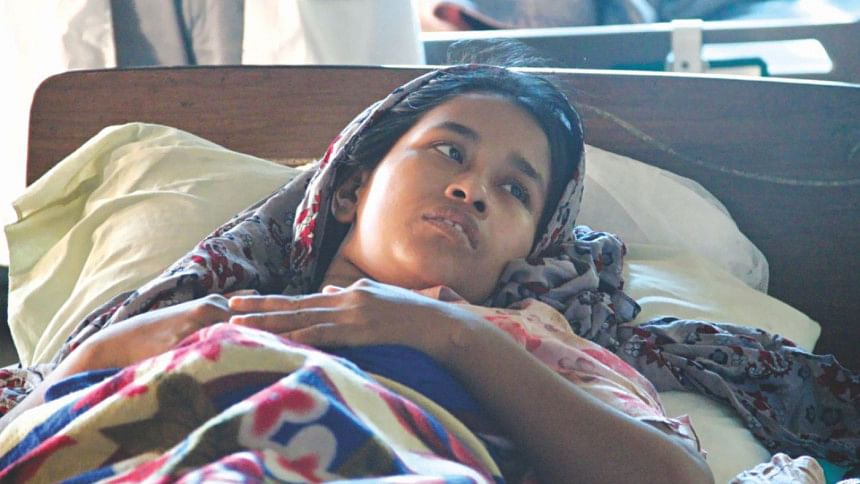Maternity and poverty: Fistula in Bangladesh

About a millennium ago Al-Asuli, great physician of Bukhara, divided his pharmacopoeia into two parts: Diseases of the Rich and Diseases of the Poor. "If Al-Asuli were alive today and could write about the afflictions of mankind," Abdus Salam, a physicist of our time comments, "I am sure he would again plan to divide his pharmacopoeia into the same two parts." Incidence of Fistula, a disease mostly of the poorer class, is a case in point. It is a disease of women, of mothers, who are the poorer ones among the poor.
Mothers risk their lives to bring other lives on earth. Many lose their lives, more of them even live with scars. One such scar is obstetric fistula, a disorder of female genitalia, mainly associated with the birth process. As medical technology advances, mother mortality has reduced. But as poverty and social inequality still reign, many continue to suffer.
Female genital fistula is a severe morbid condition of genitalia. Fistula affected women experience uncontrolled, non-stop passage of urine or/and feces per vagina. This happens when the birth canal gets connected with urinary system (urethra and bladder mainly) or/and rectum through abnormal hole(s).
Historically, obstructed labour has been the main cause contributing to those holes finding ways for urine or feces leak through the vagina. In cases of obstructed labour, the fetal head gets arrested in the birth canal for long (say, 12) hours. The fetal head adds pressure on the thin soft wall of vagina against pelvic bones. Prolong pressure causes death of the vaginal wall and holes get generated.
In Bangladesh, three fourths of all fistula cases at present are due to obstructed labour. Genital fistula, a major form of obstetric morbidity, is commonly associated with neglected, under-attended delivery.
As hospital deliveries go up, obstructed labour cases go down. However, incidence of iatrogenic fistula is evidently going up.
Partograph, a simple tool used by midwives and nurses to plot progress of normal delivery in a graph is very helpful for prompt diagnosis of obstructed labour. It helps prevent fistula. Unfortunately, most hospitals here hardly use partograph.
A situation analysis report indicated 71,000 fistula cases in Bangladesh in 2003. Two thousand new cases are being added, annually.
Early marriage is a predisposing factor of fistula. Discouraging early marriage is likely to reduce incidence. Quality pregnancy care is of high import in early prevention. In case of obstructed labour, timely referral to a facility where caesarian section is available will help.
Caesarean section is no doubt a solution for women at obstructed labour. However, rampant use of caesarean section is injudicious. Quality care is the key. More important is improved nutritional status of women. It helps deal with stresses of pregnancy and labour.
In most fistula cases, the only option is surgical repair. Fistula surgery demands high skill but is a relatively low-tech surgery. Fistula surgery is available at National Fistula Center, Dhaka Medical College, Bangabandhu Sheikh Mujib Medical University, and in a number of private hospitals in and out of Dhaka. In all concerned hospitals fistula repair operations are done absolutely free. EngenderHealth Bangladesh, with USAID, is currently working with Ministry of Health and Family Welfare in project Fistula Care Plus for prevention, repair and rehabilitation of fistula victims.
Divorce is a common consequence in fistula cases. They are often segregated. They are not allowed in the bridal bedroom, and not allowed in the kitchen, even to touch utensils. They feel themselves dirty for prayer and keep away from holy books. In some cases, they are not allowed to touch children. Thus surgical repair as such for a fistula patient is often not enough. Community leaders, imams, teachers, local government representatives may play a helpful role in reintegration.
Fistula is a disease of the poor. It needs a concerted and collective effort. A fistula-free Bangladesh claims all of us. Awareness is not all, but only a small step.
Desdemona Khan is an anthropologist at Centre for Asian Arts and Cultures, Dhaka; Dr Nazmul Huda and Dr. Abu Jamil Faisel work at EngenderHealth Bangladesh.

 For all latest news, follow The Daily Star's Google News channel.
For all latest news, follow The Daily Star's Google News channel. 



Comments